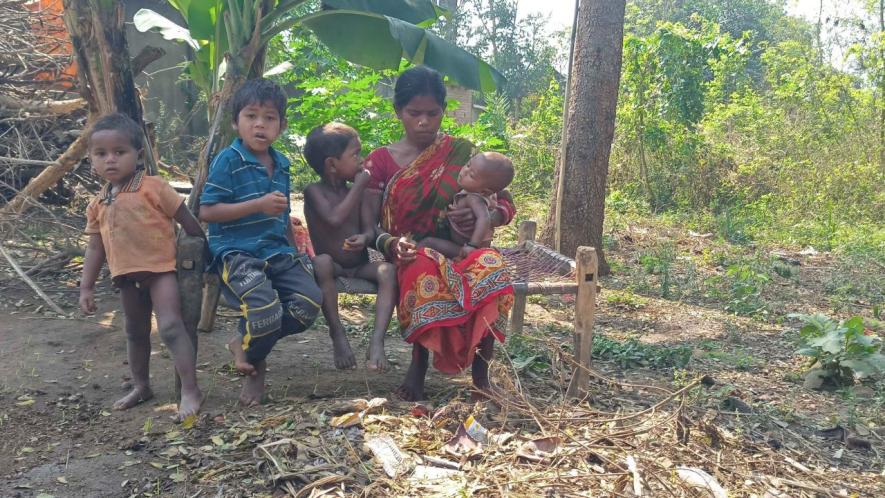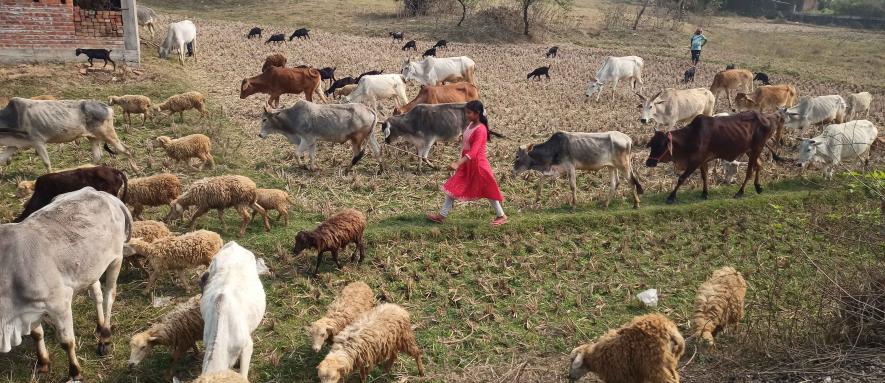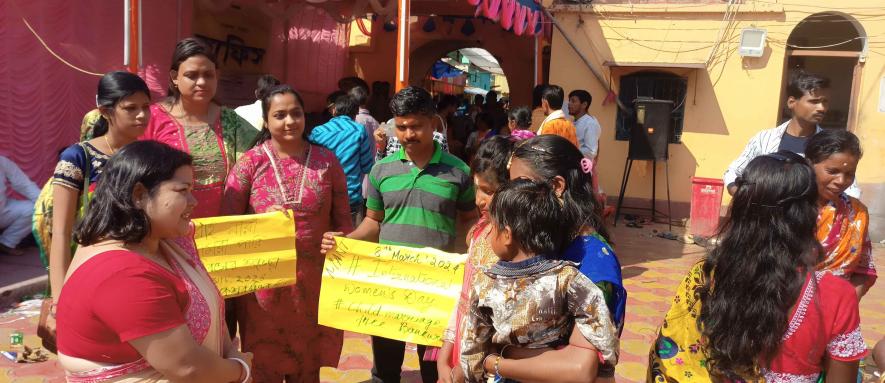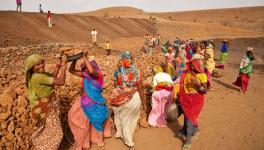Bengal: Underage Marriage a Crisis in Jangal Mahal Areas

A woman who was married when she was below 18.
Amidst the closure of schools due to the COVID-19 pandemic from 2020 to 2022 and the halt in Mahatma Gandhi National Rural Employment Guarantee Act (MGNREGA) work in rural areas, families in Bengal's Jangal Mahal areas are facing exacerbated financial strains.
Adolescent girls, both in school and those who have dropped out, are particularly vulnerable in this scenario. They are often seen as burdens by their families and are consequently married off at a young age. The widespread use of smartphones further compounds their plight, as unrestricted access to social media platforms like Facebook, WhatsApp, and Instagram exposes them to various dangers. Many underage girls, driven by illusion or coercion, run away from home to get married. Subsequently, they face extreme physical and mental crises due to financial pressures and unforeseen social hazards.
Despite initiatives like the Kanyashree Prokolpo, aimed at incentivising education for teenage girls, underage marriages continue unabated, particularly in Bankura and Purulia Districts of Bengal's Jangal Mahal. Local panchayats' failure to take effective action despite being aware of these incidents raises questions about their role. Moreover, the concerned state government department often remains uninformed about underage marriages, rendering them virtually helpless in addressing the issue.

A girl who has dropped out of school grazing her field
Marriage at an underage, below 18 years, exposes adolescent girls to health risks, including premature maternal deaths and increased infant mortality rates. Surviving mothers and children suffer from severe malnutrition and anaemia due to inadequate nutrition. With families lacking stable incomes in both paternal and in-law households, the tragic consequences of underage marriages are spreading across vast areas of the two districts.
Over time, this phenomenon is rapidly worsening, becoming an accepted norm in these areas. Urgent intervention is necessary to address the root causes of underage marriages and protect the rights and well-being of adolescent girls.
What Circumstances Lead Girls to Underage Marriages?
"Last year, I passed the Madhyamik (secondary education) exam with 412 marks. I studied at Bandowan Girls High School in Purulia District. In 2022, while I was studying in the 10th standard, my father married me and my younger sister simultaneously. My sister was in the ninth grade at the same school. We are four sisters, and our father is a migrant labourer. We were married into a family where my sister and I now have two sons. Unfortunately, we struggle to provide sufficient breast milk for both children. Additionally, my husband and brother-in-law lack stable employment," says Mithu Shabar (name changed), reflecting on her situation.
The marriage took place in Sayerberia village of Hatogram Panchayat under the Indpur Block of Bankura District. She recalled, "Our paternal house is in Bandudoba village of Bandowan Block, Purulia, where many girls from my paternal home village were married off while still in school."
Sayer Beria village, located 203 kilometres from Kolkata under the Indpur Block, Bankura, is home to 32 families belonging to the Shabor primitive tribal community. Despite holding government job cards, most families are deprived of work under the MGNREGA scheme and struggle with extreme malnutrition.
Shisu Sabar, a resident of this village, alleges that Panchayat members affiliated with the Trinamool Congress seldom visit the village. The villagers subsist on whatever they can gather, including snakes and field mice, as they live in dilapidated houses. Despite repeated attempts to seek assistance from the panchayat, they have yet to receive any housing assistance under the Pradhan Mantri Awas Yojana.
Kalpana Sabar reveals that girls in her village are married off between the ages of 14-15. Similarly, brides coming from outside the village are also below the age of 18. Several housewives, including Mithu, Sakuntola, and Puja Sabar (name changed), reveal that they venture into the forest every morning to collect white stones, which they sell for Rs 12/basket. Due to their weakened health, they can only lift a maximum of five baskets, often leaving their children unattended in the fields. Most women in the village age prematurely, and their vitality diminishes with each passing day.
According to the National Health Survey 5, the prevalence of women aged 20-24 years marrying at 18 years old remains high in Bengal at 41.6%, compared to the national figure of 23.3%. This statistic is even higher in the Jangal Mahal area. In most cases, underage marriages go unreported and unaddressed, leading to dire consequences when they come to light.
Currently, residents in these areas face limited opportunities for education and decent work. Despite the enactment of the Prohibition of Child Marriage Act (2006), the practice of marrying off young girls persists, fuelled by a socio-economic spectrum rife with structural inequalities and regressive social norms. Several student hostels and Madhyamik Shiksha Kendras (grades 5-8) have shuttered in the Jangal Mahal area, where girls once pursued their education.
Previously, hostel grants were credited directly to school accounts, but now they are deposited into the beneficiaries' accounts, often delayed. Many students fail to transfer these funds to their schools upon leaving, leading to financial crises and subsequent closures of several hostels. Some hostels now operate at reduced capacity, accommodating only 5-15 students to maintain government register records, while others have ceased operation altogether.
Sarbani Mahato, 16 (name changed), shared her story.
"I attended Ranibandh Girls' School until eighth grade, but when the COVID-19 pandemic struck and schools closed, I ceased my studies. Within three years, many of my female classmates were married off. When schools reopened two years ago, my migrant labourer father insisted I no longer needed an education. I was then engaged in tending to cows and goats on a farm, and I am set to marry within two months, arrangements finalised with the groom's family."
A few months ago, a migrant worker returned to his native village of Kulyam under Rudra Gram Panchayat in Ranibandh Block, Bankura, seeking to arrange a marriage for his 15-year-old daughter. Intervention from the childcare unit of Bankura prevented the marriage. The worker, residing elsewhere, expressed concern for his three adolescent daughters left unprotected at home. Despite this, numerous young girls in the village are already married, often overlooked by the community.
The root cause of this resurgence in underage marriage lies in the lack of local employment opportunities, predating the COVID-19 pandemic, which has driven many residents of Bankura and Purulia districts to seek migrant work across the country. As MGNREGA work has ceased, many are forced to migrate again, including a significant number of school dropouts. Trains departing from Purulia to Chennai weekly are primarily filled with migrant workers.

Campaigning by MANT against underage marriage at a fair in Bankura Aketswar
Chandidas Mukherjee, Secretary of Mallabhum Ananda Ashram Nityananda Trust (MANT), emphasised that the resurgence of underage marriages stems from poverty and financial insecurity. He noted a loss of common sense in the face of extreme poverty, burdening families with daughters, sentiments echoed by Janhobi Majhi, a schoolteacher at Bishnupur High School.
She observed, "At 13 years old, families begin seeking grooms for their daughters. Poverty, coupled with societal expectations, dictates these decisions, irrespective of caste or income. Unfortunately, the autonomy of the girl's choice is often disregarded in these matters."
In 2009, the world became familiar with the name Jhalda, located in the Purulia District, when a 13-year-old girl named Rekhe Kalindi bravely spoke out against underage marriage. Her courage earned her the prestigious bravery award from the then President of India, Pratibha Patil. Kalindi was hailed as a messenger of social change, and Jhalda became a beacon of hope. However, in the last five years, the incidence of underage marriage has surged in the Kotshila and Joypur areas of the Jhalda subdivision.
The West Bengal state government launched the Kanyashree Prokalpo in 2013 to counteract this troubling trend. This initiative aims to incentivise the education of teenage girls aged 13-18 while simultaneously discouraging underage marriage.
According to the state budget, the scheme has benefitted 81 lakh female students and garnered international recognition with the United Public Service Award in 2017. Under this project, girls from standard eight receive Rs 1000/year. If they remain unmarried until the age of 18, they receive Rs 25,000. Additionally, upon reaching 18 years of age, if they marry, they are entitled to another Rs 25,000 under the 'Ruposhree' project.
Despite these efforts, many schoolgirls in the Jangal Mahal areas of Bankura and Purulia are getting married while still studying in ninth or tenth standards, below the legal age of 18. They obtain unmarried certificates from the local panchayat to claim the Rs 25,000 incentive meant for remaining unmarried until they are 18. Even when their marriages are known, there is little recourse, as the pressure from parents and panchayat compels authorities to disburse the funds. Allegations suggest that political motivations influence these decisions, particularly by the TMC and BJP-run panchayats.
The unchecked use of smartphones poses additional risks, as many students engage in love relationships through social media and may marry without informing their families, sometimes even resorting to elopement. Those who marry and move to their in-laws' homes often face disillusionment if their husbands are unable to provide financially, forcing them into labour. In many cases, the parents of these girls sever ties, leaving them to suffer from immense mental anguish.
Sukumar Paine, the State Secretary of the All Bengal Teacher Association, noted the cessation of the 'Jibon Shoyli' (lifestyle) subject during the Trinamool government's tenure. This subject previously taught students how to maintain mental and physical well-being during adolescence.
The state government's initiative to provide Rs 10,000 for purchasing smartphones to students who have passed class 11 during the COVID-19 lockdown raises questions about the efficacy of these devices for educational purposes.
Underage marriage often leads to tragic consequences, with many young mothers and their children losing their lives due to complications during childbirth.
Dr Srimanta De, a gynaecologist in Bankura, highlighted the risks associated with childbirth in underage mothers. Additionally, Sajal Shing, an officer of the Child Care Unit in Bankura District, emphasised the importance of prompt intervention and legal action in cases of attempted underage marriage. Organisations like MANT Bankura actively engage in awareness campaigns to prevent such marriages.
The writer covers the Jangal Mahal region for ‘Ganashakti’ newspaper in West Bengal
Get the latest reports & analysis with people's perspective on Protests, movements & deep analytical videos, discussions of the current affairs in your Telegram app. Subscribe to NewsClick's Telegram channel & get Real-Time updates on stories, as they get published on our website.
























